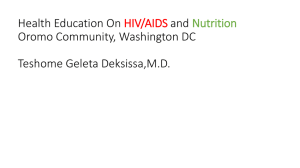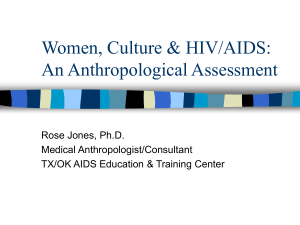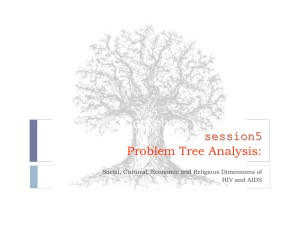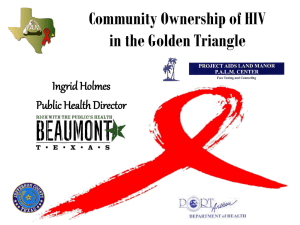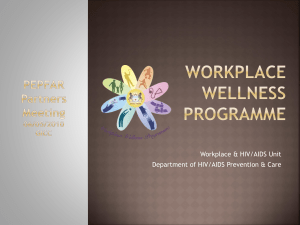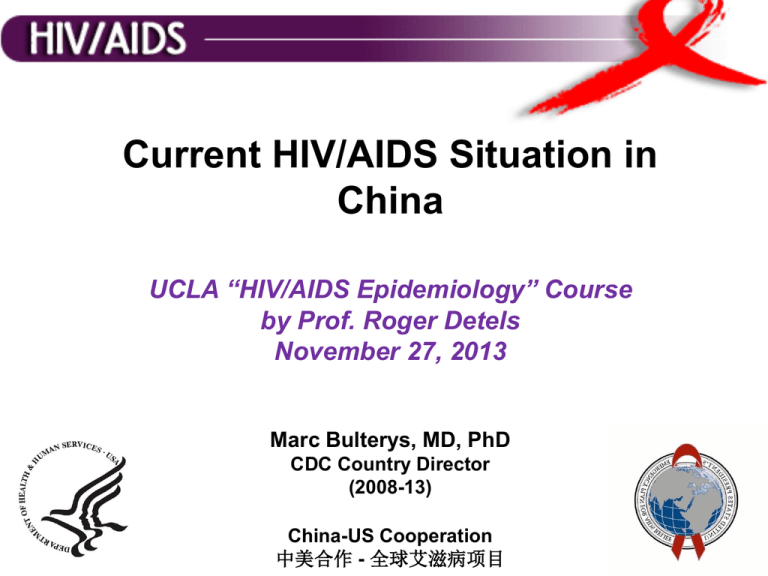
Current HIV/AIDS Situation in
China
UCLA “HIV/AIDS Epidemiology” Course
by Prof. Roger Detels
November 27, 2013
Marc Bulterys, MD, PhD
CDC Country Director
(2008-13)
China-US Cooperation
中美合作 - 全球艾滋病项目
1
Overview
• Description of the HIV epidemic in China
• Ongoing challenges
• History of US-China cooperation on
HIV/AIDS
2
National Targets by 2015
– Goals:
• The number of people living with HIV/AIDS be controlled to
no more than 1,200,000
• New HIV infection 25%
• AIDS mortality 30%
– Measures:
• Prevention: 90% coverage for high-risk, 70% HIV testing
• ART: >80%
• PMTCT: >80%
3
Leadership commitment
4
Overview of HIV Epidemic in China
Population
HIV Prevalence (2011)
HIV incidence (2011)
General population
0.1%
48,000
Key populations
FSW
MSM
PWID
0.5%
6.3%
6.4%
0.1 per 100 pyrs
3-6 per 100 pyrs
0.2 per 100 pyrs (MMT);
1-3 per 100 pyrs outside
Stable HIV incidence with ~50,000 new HIV infections per year
(highest recent estimate in 2007: 70,000)
800,000-900,000 estimated PLHA (2013)
260,000 PLHIV eligible for ART at CD4<350 (2012)
164,000 and 63% eligible on ART; 80% of known (2012)
28,000 deaths due to HIV (2012)
2012 China AIDS Response Progress Report, China MOH; UNAIDS; NCAIDS (2013); personal communication
HIV Prevalence in Key Populations
2012 China AIDS Response Progress Report, China MOH; from China’s HIV Sentinel Surveillance System
Note: The arrow indicates the decrease in HIV prevalence amongst MSM
increase on 2009, when 42.2% were infected through heterosexual transmission.
Homosexual transmission accounted for 29.4% of cases, a 3.1% increase on the 2009
HIV Prevalence Among MSM
figure of 32.5%.
2012 China AIDS Response Progress Report, China MOH
Figure 4 HIV prevalence among MSM from selected HIV sentinel surveillance sites
Transmission Modes Change Overtime
Sexual
83.2%
Unknown
MTCT
Blood
IDU
MSM
Heterosexual
8
MSM Account for 50% of Newly Reported
HIV Cases in Provincial Capital Cities
MTCT
Blood/products
MSM
Hetero
sexual
IDU
Methadone Reduces HIV
Incidence Among Drug Users
26%
10
October 29, 2010
11
Key Populations:
Opportunities and Barriers
All: Late treatment initiation, high mortality pre-ART
FSW:
Barriers to accessing care and maintaining ART adherence
Low-fee and rural FSWs have higher HIV/STI rates; in some cities
linked with heroin and amphetamine use
MSM:
Increasing HIV transmission, limited intervention coverage in many
cities and continuing stigma issues
PWID:
Low ART coverage & treatment retention, high mortality & comorbidities. Need earlier HIV diagnosis & better ART access
MMT clinics can be platforms for comprehensive HIV services,
including DOT ART
National Free ART Program - 1
• National Free ART Program began in 2002 among
former plasma donors
• Rapidly scaled up to cover entire country
120000
100000
80000
60000
40000
20000
0
2005
2006
2007
Accumulatvie # on treat.
2008
2009
2010
Current on treat.
13
National Free ART Program - 2
• Currently over 200,000 patients from all high-risk
groups on ART (AZT/TDF + 3TC + NVP/EFV)
• CD4 tests now routine; annual viral load tests
recommended in 2009, gradually scaled up
• Second-line antiretroviral therapy introduced in
2008; currently >15,000 patients on second-line
drugs (usually TDF+3TC+LPV/r)
14
Five-Year Survival and Mortality Rates
Zhang F et al. Annals of Internal Medicine 2009
15
ART Coverage Increases
but Needs Further Expansion
Lancet Infectious Disease 2011: ART coverage 78% in FPD, 60% in sexual
transmission population and only 39% in PWID
16
Cascade of HIV Services in China (2012)
17
Increase in Integrated PMTCT programs,
2003-2010
8 pilot counties in
2003
333 pilot counties in
2008
271 pilot counties in
2007
1156 pilot counties in
2010
(HIV+Syphilis+HBV)
18
Trends in MTCT of HIV in 15
Selected Counties in China, 2005-2009
20
18
16
14
12
Before correction
After correction
10
8
6
4
2
0
2005
2006
2007
2008
2009
Manuscript on trends in mother-to-child transmission of HIV-1 in China, NCWCH (submitted)
Barriers and Challenges
~50% of PLHA are unaware of their HIV status
Frequent late enrollment in care & ART initiation
Barriers and Challenges
High burden among ethnic minorities: 8% of
population but with 38% of HIV cases, often
residing in rural and remote areas
Multi-sectorial collaboration to improve linkages
between vertical health systems (MCH, CDC, MMT,
hospital)
Limited involvement and capacity of civil society
Severe poverty and inequitable financing of basic
health care in certain regions
History of US-China Cooperation on
HIV/AIDS
•
•
•
•
CDC assessment mission to China in 2001
GAP office established in Beijing in Oct 2003
NIH CIPRA grant ended in 2010
Transition of USAID HIV/AIDS activities in Guangxi
and Yunnan to local government (2011)
• Continued emphasis on technical collaboration
between US and China CDCs (2013-)
22
Technical Collaboration Framework
• Goal
• Strengthen partnership between US CDC and China
CDC for HIV/AIDS response within and beyond China
• Principles
•
•
•
•
•
Integration
Innovation
Evidence-based
Experience sharing
South-to-South cooperation
23
US-China Cooperation Provinces
(2003-2013)
Heilongjiang
Inner Mongolia
Xinjiang
Beijing
Shandong
Ningxia
Qinghai
Henan
Tibet
Anhui
Focus (high prevalence)
TA only (low prevalence,
high risk and/or unique epidemics)
Jiangsu
Guizhou
Yunnan
Guangxi
Guangdong
Previously supported
Rural AIDS Clinical Training Centers
in Liangshan, Luzhai, and Lixin
24
Support of Epidemiologic Data Analysis and
Operational Research to Improve HIV/AIDS
Outcomes in China
PMTCT and Community Mobilization
Increased use of antenatal care and hospital delivery
services among minority women in Guangxi
26
Rural AIDS Clinical Training Centers
in three provinces
• Three training centers:
– Lixin (利辛) , Anhui (2004)
– Luzhai (鹿寨), Guangxi (2010)
– Liangshan (凉山), Sichuan (2012)
• Transitioned Lixin center to local
government in 2011
• Trained 229 rural physicians who are
serving >20,000 patients on ART in
16 provinces by 08/31/13
27
Thank you!
Special thanks to NCAIDS
and NCWCH, China CDC
特别感谢国家性艾中心和国家妇
幼保健中心
Dr. Wu Zunyou (NCAIDS
Director)
WHO, UNICEF and UNAIDS
Staff of the US CDC’s Global
AIDS Program in China
28

